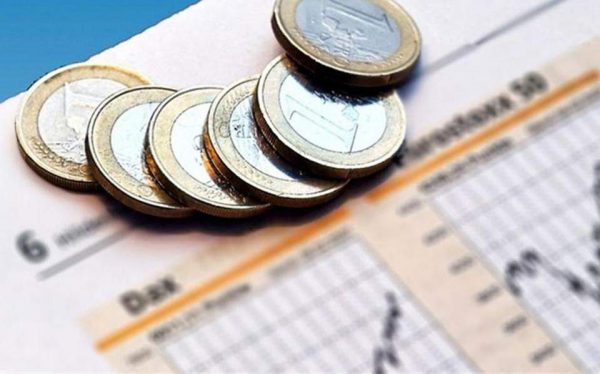
In the shadow of storms Daniel and Elias and the devastating fires that devastated Greece, the draft budget was submitted to Parliament.
“The 2024 budget is the first after thirteen years to be drawn up with the country having recovered its investment grade. An achievement that is primarily due to the hard work and sacrifices of Greek society, combined with the prudent and effective fiscal policy of recent years, the successful response to successive external crises and the political stability that the country has achieved” is stated in the relevant press release issued by the Ministry of Finance.
The statement added that the 2024 budget is being prepared a few days after successive natural disasters that hit the country in August and September 2023, which highlights that the consequences of climate change will be here and need to be addressed on a permanent basis. To this end, it is a priority to shield the country against extreme natural phenomena through the creation of more resilient infrastructure, the strengthening of civil protection and prevention.
At the fiscal level, it is obvious that a provision of relevant funds is needed each year in the budget, strengthening of safety as well as speed and efficiency of state aid.
At the same time, the international economy is showing signs of slowing down, fiscal risks in European countries are increasing, inflation, although decelerating, continues to remain high internationally, especially in basic food items, while the restrictive monetary policy has a negative effect on credit expansion.
The prospects for growth
In this unfavorable and uncertain international environment, the Greek economy is proving resilient.
The growth rate remains within the targets set in the April 2023 Stability Program and is expected to rise to 2.3% in 2023 and 3% in 2024. Gross Domestic Product (GDP) in nominal terms is expected to increase from €208 billion in 2022 to 224 billion euros in 2023 and 235 billion euros in 2024. At the same time, the Harmonized Index of Consumer Prices is expected to fluctuate at slightly lower levels and be formed at 4% against the 4.5% foreseen in the Stability Program for 2023 and further decelerate to 2.4% for 2024. Investment is expected to increase by 8.3% this year and by 12.1% in 2024, while unemployment is expected to decline from 11.2% in 2023 to 10.6% in 2024.
The 2024 budget is called upon to reconcile the goal of fiscal stability, which is the foundation for every effort, with the new needs that are created as well as with the basic project of society, after the inflationary crisis, i.e. the increase of disposable income and wages.
Significant increase in tax revenue
In the 2023 budget it was possible to have a significant increase in tax revenues by 9.1% compared to 2022 without increasing taxes, a development that is largely linked to the high growth rates of the Greek economy. For example, according to the figures of the quarterly national accounts of the Hellenic Statistical Authority, the total remuneration of dependent labor shows an increase of 7.6% in the second quarter of 2023 compared to the corresponding quarter of 2022. The increase in wages, without affecting competitiveness , strengthened budget revenues, contributing to the achievement of fiscal targets.
For this purpose, the budget has included all the measures announced before the elections to be implemented in 2023 and all the measures announced at the International Exhibition of Thessaloniki. Policies such as the increase in the salaries of public employees, the reinstatement of the three-year raises for employees, the increase in the tax-free allowance for families with children, the increase in the minimum guaranteed income, the re-increase of pensions, but also investment resources amounting to 12.1 billion euros through the Public Investment Program (8.5 billion euros) and the Recovery and Resilience Fund (3.6 billion euros), which are expected to flow into the economy within 2024. In addition, the health sector is being strengthened with an increase in the subsidy of hospitals by approximately 15%.
Combating tax evasion
At the same time, the major changes that the country needs are prioritized with a series of measures that have been announced to combat tax evasion. After the already significant reduction of the VAT gap in previous years through the strengthening of electronic transactions, the aim is to reduce it further to the average level of EU countries by 2026, which according to the latest available measurements amounts to around 9%.
All of the above is carried out without deviating the country from its fiscal targets. Despite the successive crises, the primary result of the General Government in 2022 was set at a marginal surplus of 0.1% of GDP. In the introductory report of the 2023 budget, the primary surplus for 2023 was projected at 0.7% of GDP, while in the Stability Program of April 2023 the primary result was estimated at a surplus of 1.1% of GDP. According to the latest data on the execution of the budget, the primary result of the General Government for 2023 is estimated to be a surplus of 2,560 million euros or 1.1% of GDP, close to the forecasts of the Stability Program. The overall result of the General Government is estimated to be close to the forecasts of the introductory report of the 2023 budget, due to the increase in General Government interest and is formed at a total deficit of 2.1% of GDP, against 2.0% which was the forecast of the 2023 budget.
Primary surplus
Accordingly, the primary result for the year 2024 is projected to be 2.1% of GDP in accordance with the objectives of the Stability Program. The fact that the fiscal result of the years 2023 and 2024 remains within the estimates that were reflected in the Stability Program, strengthens the credibility of the country’s debt in view of the upcoming assessments.
General Government debt is expected to de-escalate impressively from 171.4% of GDP in 2022 to 159.3% in 2023 and to 152.2% in 2024.
The above proves that the country has entered a virtuous cycle of debt reduction and economic growth. Of course, economic activity depends on developments in the international environment and possible external crises. Economic stability and progress can only be ensured if the set fiscal goals are strictly adhered to, while channeling the limited fiscal resources in a targeted manner, with the maximum possible economic and social efficiency.
Macroeconomic developments
In 2022, the GDP growth rate of the Greek economy was set at 5.9% on an annual basis. Despite the energy crisis and related inflationary pressures throughout the previous year, the strengthening of private consumption, significant investment activity and the boost from the recovery of tourism during the summer period contributed to this strong performance.
According to Eurostat data, the real GDP of Greece in the second quarter of 2023 showed clearly better dynamics, compared to the other member states of the European Union (EU). This high yield (2.7%) placed Greece in second place among Eurozone countries, following Malta (3.9%), and at a significantly higher level than the Eurozone average (0.5%).
The economic growth rate of the Greek economy for 2023 is estimated at 2.3%. Both the increase in private consumption by 2.5% in constant prices and the increase in investments by 8.3%, as well as the export of goods and services, which are expected to increase by 2.7% in constant prices, contribute to this development. and at a higher rate than imports (2.2%).
Labor market
The labor market continues to develop satisfactorily in the first months of 2023, with total employment increasing by 1.7% compared to the corresponding period of the year 2022. According to the balance of salaried employment flows of the ERGANI employment reporting system, in the period January – July 2023 296,624 new jobs were created compared to 270,191 in 2022, which is the highest performance since 2001. The increase in hiring took place in parallel with the increase in the minimum wage, suggesting that the increases are also accompanied by an increase in wages. In this context, dependent labor wages are expected to increase in 2023 on an annual basis by 6.5% compared to 5.4% that increased in 2022. It is noted that according to the data of ELSTAT’s quarterly national accounts, the total of dependent labor wages of labor shows an increase of 7.6% in the second quarter of 2023 compared to the corresponding quarter of 2022.
The unemployment rate in the second quarter of 2023 stood at 11.2%, down from both the 11.8% rate in the 1st quarter and the 12.4% rate in the corresponding quarter of the previous year. It is noted that the above figure of 11.2% constitutes the lowest unemployment rate since the 4th quarter of 2009. This result was contributed by the policy measures implemented both during and after the pandemic, which were aimed at shielding the positions work. Typical examples of policies include reducing non-wage costs by reducing social security contributions, suspensions of workers with special purpose compensation during the pandemic, “first social security contribution” and subsidizing social security contributions for converting part-time to full-time positions.
Inflation
The change in the E.CPI (Eurostat) in Greece in the period January – August 2023 fell to 4.7%, from 9.2% in the corresponding period of 2022. The average change in the E.CPI in the Eurozone amounted to the period January – August 2023 to 6.7%, from 7.6% a year ago. The above change in the E.CPI in Greece in the period January – August 2023 ranks the country in the last positions among the countries of the Eurozone in terms of the rate of change.
The change in the Harmonized Index of Consumer Prices (HPI), taking into account the accounting data of the relevant index during the period January – August 2023, is estimated at 4.0% for the whole of this year against the annual forecast of 4.5% of the Stability Program compiled in April 2023. The annual rate of change of the National Consumer Price Index is estimated to be slightly lower and equal to 3.8%.
As regards the current account balance, based on data from the Bank of Greece (BoG), at current prices, in 2022 it worsened, recording a deficit of 9.7% of GDP, while in the seven months of 2023 it shows an improvement, reducing the deficit by 3.6 billion euros compared to the corresponding period of 2022.
In conjunction with the above, a pivotal achievement for the Greek economy is the upgrade of its credit rating to investment grade during the months of July, August and September by the international rating agencies R&I, Scope Ratings and DBRS Morningstar as well as the double upgrade, a just a level before the investment grade, by the rating agency Moody’s, following the strengthening of the country’s prestige and credibility, with the twelve consecutive upgrades of the Greek economy, despite the successive external crises in the last four years.
The global recovery boosted by the post Covid-19 pandemic period is showing signs of slowing amid inflationary pressures, geopolitical uncertainty and asymmetries between economies, while tight monetary policy by central banks aimed at containing inflation has led to higher borrowing costs, curbing economic activity internationally.
Production activity
An important parameter for the achievement of the above macro-economic goals is the rapid restoration of productive activity, with an emphasis on agricultural production, but also the infrastructure of the areas affected by the recent floods. For this purpose, the necessary budgetary resources have been foreseen, while using the available European funding sources to the optimum extent. However, climate change is not a temporary phenomenon. For this purpose, the Government is taking additional measures and making significant investments, through national and co-financed resources, at four levels: (a) in climate transition and decarbonisation, (b) in the development of infrastructure resistant to worsening weather phenomena, (c) in the important strengthening civil protection and prevention and (d) shielding the national economy from the consequences of natural disasters, through the provision of relevant permanent funds in the budget, the strengthening of insurance as well as the speed and effectiveness of state aid.
Financial interventions to boost income and address social inequalities
The main objective of government policy from the beginning of 2023 is to increase wages, boost disposable income and reduce inequalities. For this purpose, as early as the first half of 2023, new measures were adopted such as:
• the reform of the special salary of the National Health Service doctors with an average increase of 10% and a cost of 92 million euros for 2023 and 65 million euros for 2024 and thereafter,
• following the permanent abolition of the solidarity levy in the private sector, the abolition of the solidarity levy for civil servants at a cost of 202 million euros per year and for pensioners at a cost of 274 million euros per year,
• the settlement of salary requests of the Armed Forces at a cost of 58.5 million euros per year,
• the abolition of a special contribution of 1% in favor of the Public Employees’ Welfare Fund (TPDY) with an annual cost of 80 million euros,
• the payment in March 2023 of a one-off financial aid of 200 to 300 euros to pensioners who did not receive an increase in their pensions in 2023 due to a personal dispute at a cost of 280 million euros,
• the increase of the duration of the maternity allowance to nine months for women employed in the private sector at a cost of 64 million euros per year and
• the increase in disability benefits of the Welfare Benefits and Social Solidarity Organization (OPEKA) and the Unified Social Security Agency (EFKA) by 8% from May 1, 2023 at a cost of 63 million euros for 2023 and 95 million euros for 2024 and henceforth.
In addition, during April 2023 the minimum wage was increased to 780 euros from the amount of 713 euros.
After the double elections of May-June 2023, the formation of the government in June 2023 and the programmatic declarations, a network of interventions related to the second half of the year 2023 and 2024 was announced to stimulate disposable income and reduce inequalities.
In particular, the following measures were foreseen:
• in order to strengthen incomes in the public sector, support to a greater extent low-paid civil servants, families with children and those who hold a position of responsibility in the public sector, the public sector payroll is reformed (total budgetary cost of 50 million euros for 2023 and 906 million euros for 2024). The main interventions concern the horizontal increase of 70 euros in the basic salary, the increase of the family allowance from 20 to 50 euros per month, the increase of the allowances of the position of responsibility by 30% and the increase of the border allowance and special working conditions for the members of the Armed Forces and the Security Forces. At the same time, the salary of faculty members increases as well as the overnight expenses of civilian and uniformed personnel,
• for the adjustment of the pensions of special categories which fall under the jurisdiction of the Ministry of National Economy and Finance – GLK, increases were instituted with an annual cost of 7 million euros. Due to the retroactive effect of the regulation, depending on the category of pensioners, the fiscal cost is estimated at 5 million euros for 2023 and 56 million euros in 2024,
• for the financial support of approximately 200,000 young people aged 18 and 19, a permanent allowance of 150 euros is instituted for making purchases from companies active in the fields of culture, tourism and transport (total budgetary cost of 30 million euros for each of years 2023 and 2024),
• for the financial support of approximately 750,000 pensioners with pensions of up to 1,600 euros who have a personal difference of more than 10 euros, an extraordinary aid of 100 to 200 euros is provided in December 2023, with a budgetary cost of 107 million euros,
• the complete exemption of approximately 200,000 former EKAS beneficiaries from their participation in pharmaceutical expenses is made permanent (fiscal cost of 38 million euros per year),
• for the income support of approximately 225,000 vulnerable households, the minimum guaranteed income is increased by 8% from December 2023 (fiscal cost of 4 million euros for 2023 and 43 million euros for 2024),
• to deal with low birth rates and support the family, from 2024 the maternity allowance will be extended to self-employed workers and farmers to nine months, following the already institutionalized increase to nine months for employees in the private sector (fiscal cost of 40 million .euro for 2024),
• retroactively increases from July 1, 2023 the flight allowance for pilots and crews of firefighting aircraft, with a budgetary cost of 700 thousand euros per year.
In addition to the above fiscal measures, the following interventions are applied to the labor market and the pension system:
• from January 2024, the freeze on three-year benefits for employees will be lifted,
• the 30% reduction in pensions for employed pensioners is abolished and replaced by a 10% contribution on the additional remuneration they receive from their work and
• pensions are increased again from January 1, 2024 at the average of GDP growth and inflation 2023, with an estimated cost of 410 million euros.
In addition, interventions of a fiscal nature concern:
• increasing the tax-free allowance by 1,000 euros for taxpayers with one or more dependent children (fiscal cost of 135 million euros for 2024),
• to the reduction of ENFIA by 10% for houses insured for natural disasters,
• reforming the operating framework of the capital market with significant investment and tax incentives:
a) reduction of the fundraising tax from 0.5% to 0.2% (annual fiscal cost of EUR 22 million),
b) a 50% reduction in the stock exchange tax (annual fiscal cost of 21 million euros) and
c) abolition of the bond interest tax on government bonds (annual fiscal cost of 7 million euros).
In addition, with the aim of regulating the short-term rental market and dealing with the secondary negative effects on the real estate market and rents, a 13% VAT and a transient tax are imposed on short-term property rentals (airbnb type) to legal entities and natural persons with three or more rented apartments. The residence tax is also imposed on short-term leases of natural persons, while natural persons who have three or more rented apartments are required to start a business. Finally, the definition of short-term rental is tightened and income declaration checks are intensified.
Latest News

German Ambassador to Greece Talks Ukraine, Rise of Far Right & Tariffs at Delphi Economic Forum X
Commenting on the political developments in his country, the German Ambassador stressed that it was clear the rapid formation of a new government was imperative, as the expectations across Europe showed.

Athens to Return Confiscated License Plates Ahead of Easter Holiday
Cases involving court orders will also be excluded from this measure.

Servicers: How More Properties Could Enter the Greek Market
Buying or renting a home is out of reach for many in Greece. Servicers propose faster processes and incentives to boost property supply and ease the housing crisis.

Greek Easter 2025: Price Hikes on Lamb, Eggs & Sweets
According to the Greek Consumers’ Institute, hosting an Easter dinner for eight now costs approximately €361.95 — an increase of €11 compared to 2024.

FM Gerapetritis Calls for Unified EU Response to Global Crises at EU Council
"Europe is navigating through unprecedented crises — wars, humanitarian disasters, climate emergencies," he stated.

Holy Week Store Hours in Greece
Retail stores across Greece are now operating on extended holiday hours for Holy Week, following their Sunday opening on April 13. The move aims to accommodate consumers ahead of Easter, but merchants remain cautious amid sluggish market activity.

Green Getaway Ideas for Easter 2025 in Greece
Celebrate Easter 2025 in Greece the sustainable way with eco-farms, car-free islands, and family-friendly getaways rooted in nature and tradition.

Civil Protection Minister Details Summer Firefighting Plans at Delphi Forum
At the 10th Delphi Economic Forum, Minister of Climate Crisis and Civil Protection Yiannis Kefalogiannis discussed Greece's plans for the upcoming fire season.

How Shops and Markets Will Operate During Easter Holy Week
The Easter holiday schedule has been in effect since April 10, with retail stores open Palm Sunday, and most supermarkets also operating to meet consumer demand for Easter shopping

Why Is the French Aircraft Carrier Charles De Gaulle in Piraeus?
Docking in Piraeus after a four-month deployment in the Indo-Pacific region, the admiral of the aircraft carrier the Charles de Gaulle says, "Greece is our best partner in the Mediterranean."









































 Αριθμός Πιστοποίησης
Αριθμός Πιστοποίησης